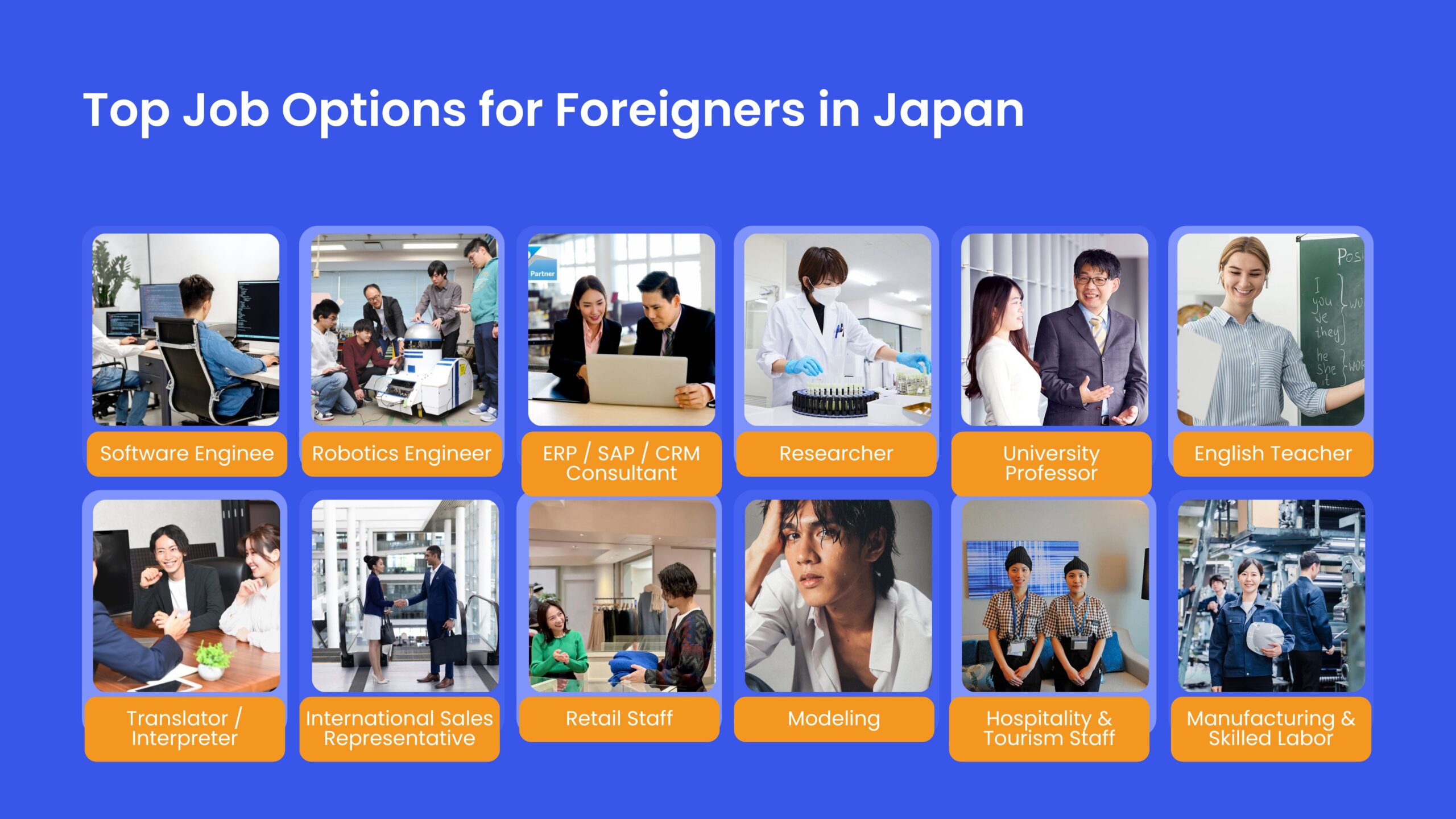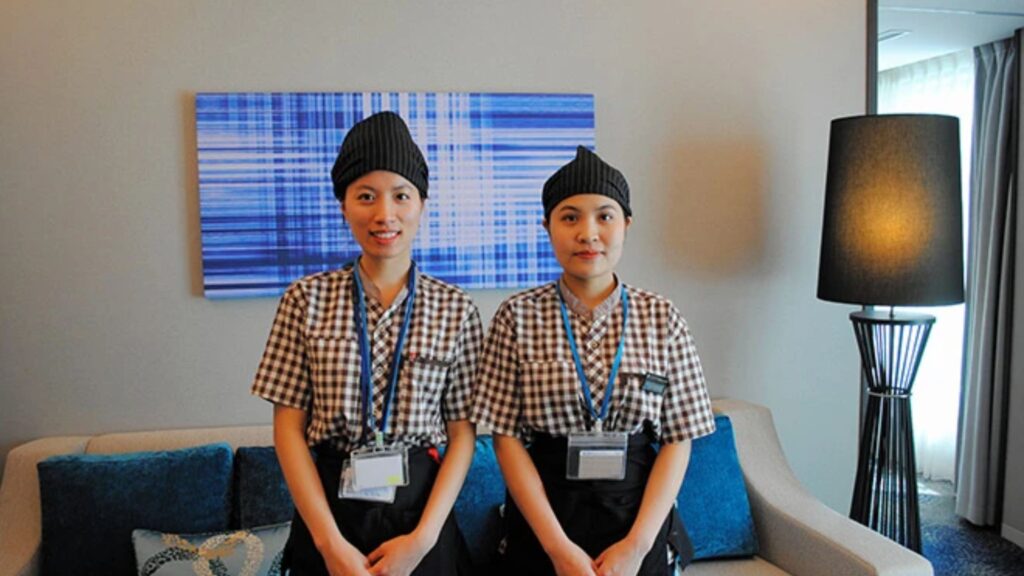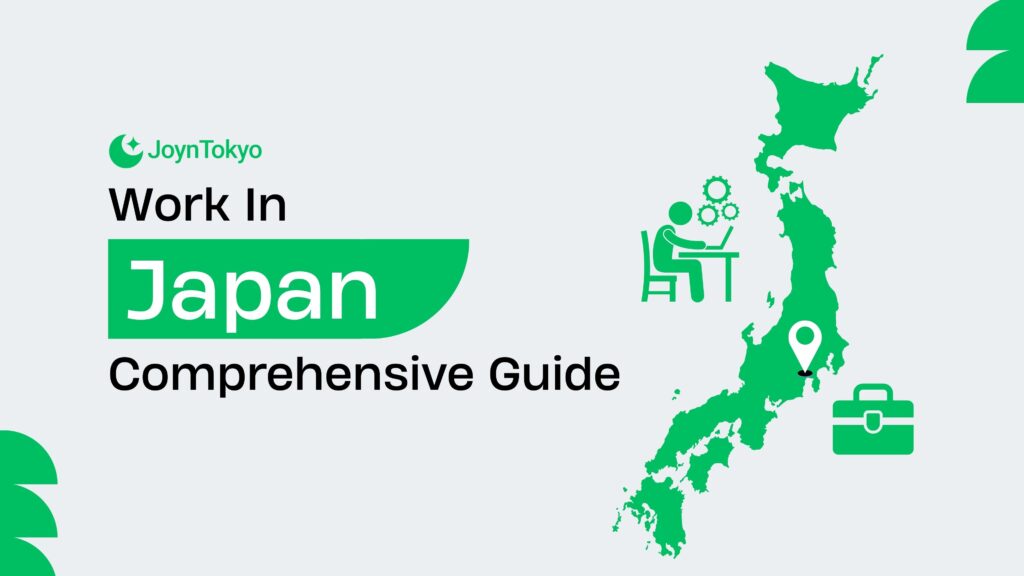Finding the right career in Japan can feel overwhelming, especially for newcomers navigating a different culture, hiring system, and set of workplace expectations. As Japan continues to face labor shortages and pushes forward with digital transformation, more companies are opening their doors to foreign professionals. This guide explains Japan’s current job landscape and highlights the top career paths available to foreign residents today.
Top Job Options for Foreigners in Japan

The following careers represent the most realistic and popular paths for foreign workers. Each section outlines typical responsibilities, expected salary, and why the job suits foreign professionals in Japan.
1. Software Engineer

Software engineering is one of the most accessible and high-paying options for foreigners. Many companies operate in English and prioritize practical skills. Salaries generally range from ¥5,000,000 to ¥12,000,000. Applicants with experience in web development, cloud engineering, or backend systems will find strong opportunities.
2. Robotics Engineer

Japan is a global robotics hub, creating demand for engineers skilled in automation, system control, and hardware-software integration. Japanese ability is helpful but not always mandatory. Compensation tends to be high due to the specialized nature of the work.
3. ERP / SAP / CRM Consultant

Consultants supporting enterprise systems are in high demand as companies modernize their operations. These roles require business understanding, system knowledge, and bilingual communication. Salaries fall in the mid-to-high range depending on expertise.
4. Researcher

Foreign researchers contribute to universities and national labs across AI, engineering, and life sciences. Some institutions operate in English, while others require Japanese. A Master’s or PhD is often required, and salaries vary greatly by field and institution.
5. University Professor

Japan’s higher education sector is expanding international programs and hiring more foreign faculty. Professors teach, conduct research, and supervise students. A PhD and strong research background are essential. Full-time positions offer stability and competitive benefits.
6. English Teacher

Teaching remains one of the easiest entry-level jobs. ALTs, eikaiwa instructors, and international school teachers typically earn ¥220,000–¥300,000 per month at entry-level. Many roles do not require Japanese, making this a common first job in Japan.
Read More
7. Translator / Interpreter

Foreigners fluent in Japanese can succeed in translation or interpretation. Roles exist in IT, gaming, legal, and medical fields, with salaries between ¥4,000,000 and ¥7,500,000. Most companies require JLPT N2 or higher and strong cultural awareness.
8. International Sales Representative

Companies expanding abroad hire foreign professionals to manage global clients and negotiate contracts. These roles require strong business Japanese and English. Salaries typically reach ¥4,000,000–¥9,000,000, often with performance bonuses.
9. Retail Staff

Retail positions include customer service roles in stores, malls, and airports. Conversational Japanese is usually required, and hourly wages are typically ¥1,100–¥1,500. These jobs suit students or dependents seeking flexible work.
10. Modeling

Modeling offers flexible, project-based work in advertising, events, and fashion. Japanese language ability is not always needed. Earnings vary widely depending on the agency and job type, making it a viable side job for many foreigners.
11. Hospitality & Tourism Staff

Hotels, restaurants, and travel services actively hire multilingual staff as tourism recovers. Full-time roles pay ¥2,500,000–¥4,000,000, while part-time wages start around ¥1,100–¥1,500. Japanese conversation skills are important, but foreign language ability is a major asset.
12. Manufacturing & Skilled Labor

Visa-supported jobs exist in factories, agriculture, and logistics. These roles typically offer ¥2,400,000–¥3,600,000 per year and require physical stamina more than advanced education. Structured training makes this field accessible to newcomers.
Understanding the Job Market for Foreigners in Japan
Japan’s workforce is undergoing major changes. Due to an aging population and increasing globalization, foreign workers are becoming essential across many industries. Japanese language ability, visa status, and professional experience remain important factors, but opportunities are more diverse than ever. While tech jobs tend to welcome English speakers, customer-facing fields usually require conversational Japanese. Understanding these trends will help you choose a path that aligns with your strengths and long-term goals.
Japanese Language Requirements
Language expectations vary greatly by industry. IT and research roles often allow English as the primary working language, while sales, hospitality, and retail require at least JLPT N3–N2. Improving your Japanese will significantly expand your career options and earning potential.
Visa and Work Eligibility
Most full-time jobs require a bachelor’s degree or equivalent experience for visa sponsorship. Fields like engineering, education, and business typically offer straightforward sponsorship, while part-time roles are more suited to students and dependents.
Read More
Boost Your Chances of Finding the Right Opportunity!
Speak to our consultants to find out how you can start working in Japan!
Book Your FREE Consultation✓ 500+ Bookings as of 2026-03-02 ✓ English-speaking support
Final Tips for Starting a Career in Japan
Thriving in Japan’s job market requires understanding local work culture. Punctuality, professionalism, and strong communication are highly valued. Creating a Japanese-style résumé, preparing for structured interviews, and improving your Japanese, even gradually, will help you stand out. Networking through meetups, industry events, and online communities can also open doors to hidden opportunities.
Read More
Japan offers a wide range of career paths for foreigners, from high-level engineering and research to accessible roles in teaching and hospitality. Choosing the right field depends on your skills, language ability, and long-term goals. With clear preparation and an open mindset, you can build a stable, fulfilling career and enjoy life in Japan’s evolving professional landscape.












